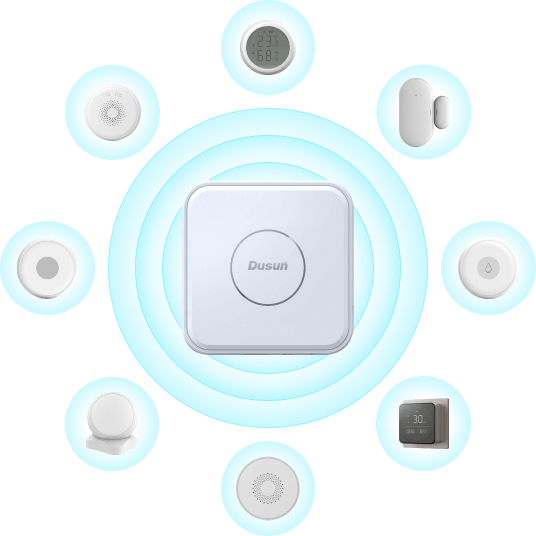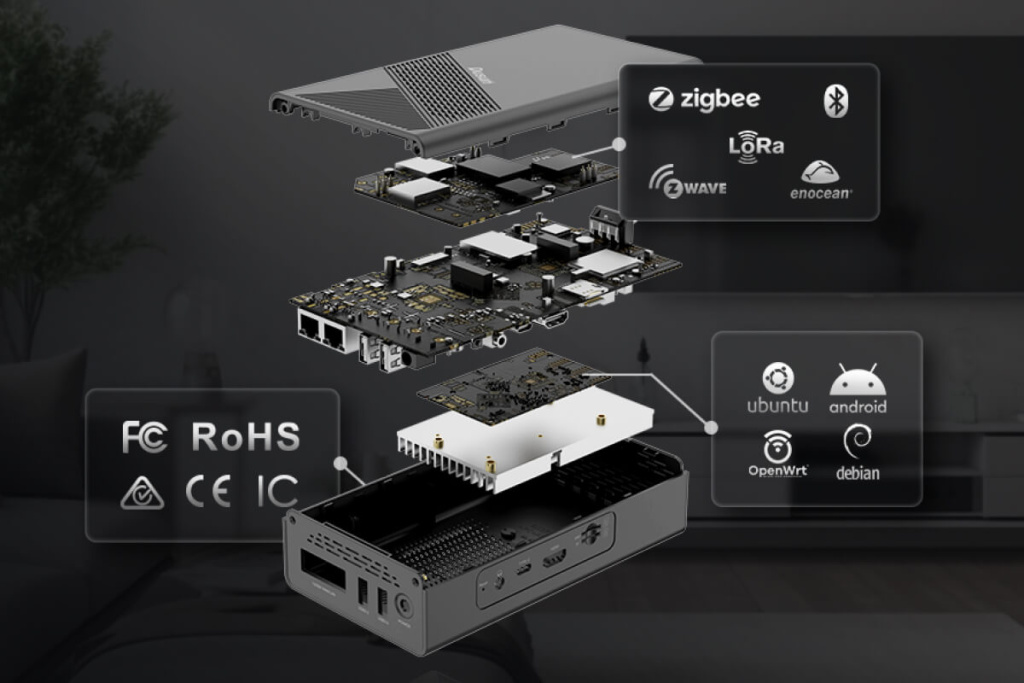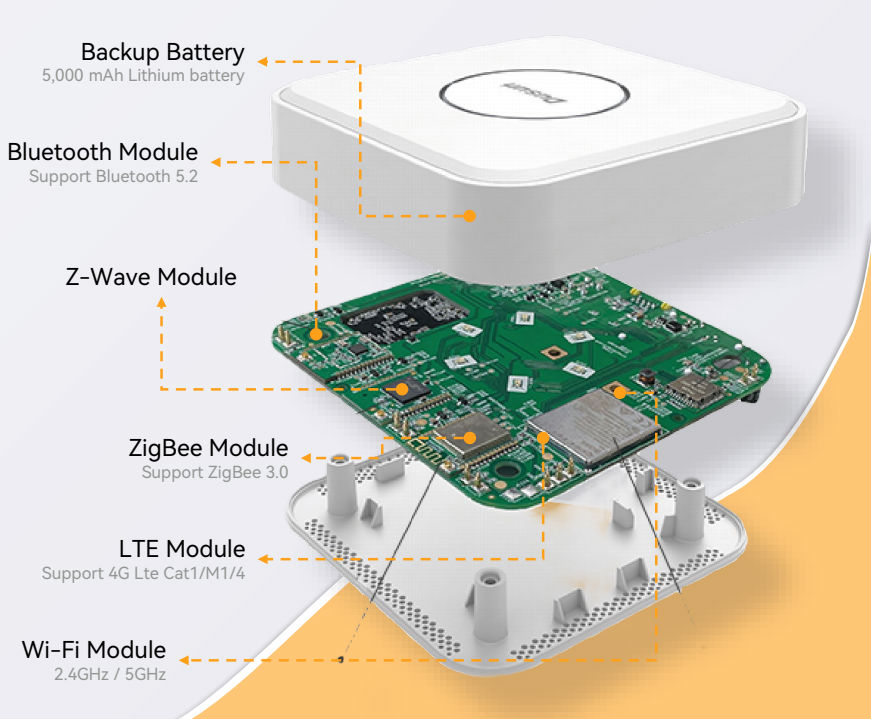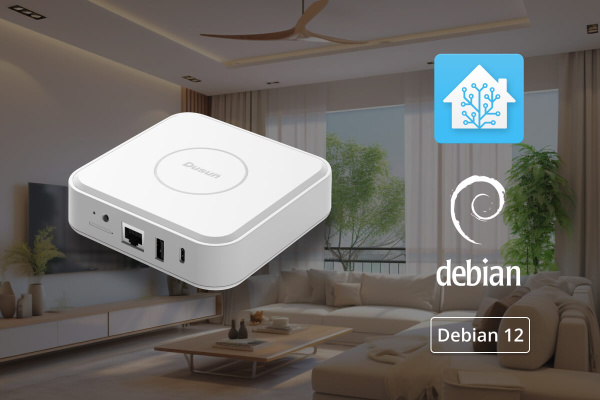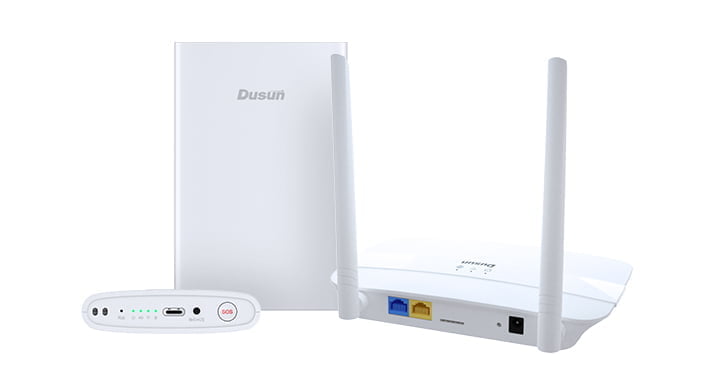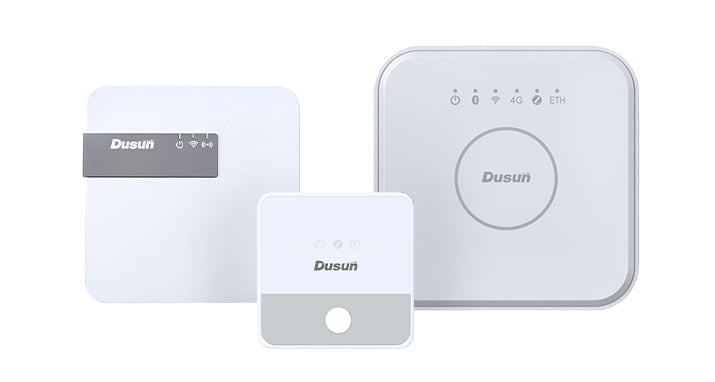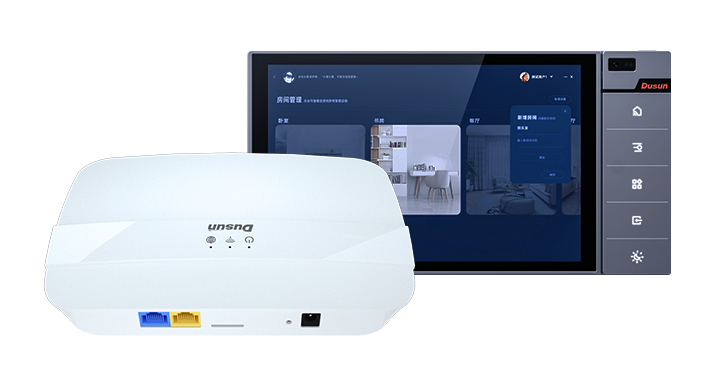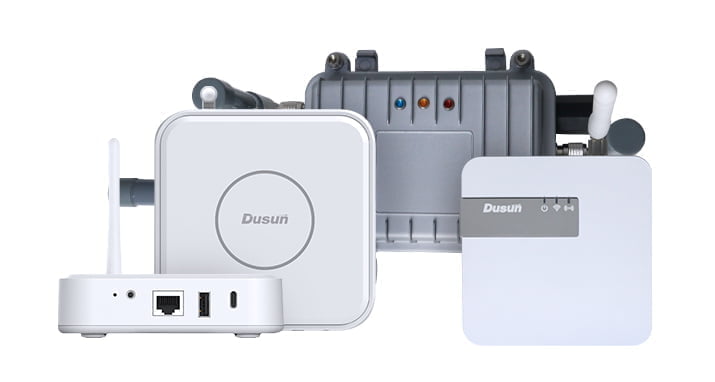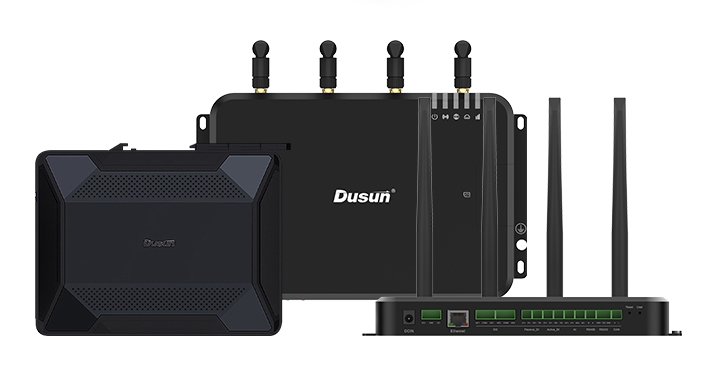Why We Need a Gateway Hub for Smart Home Solution?
Smart home devices come in various forms, and each employing different communication protocols, having distinct battery life requirements, and preferring different networking methods.
For instance, with the rapid advancement of Bluetooth technology, BLE Mesh has gained popularity in the field of smart home lighting (especially the Bluetooth mesh lighting control application), thanks to its remarkable networking performance and convenience.
Similarly, Zigbee technology, known for its low power consumption and robust networking capabilities, has become the mainstream communication protocol in the smart home domain.
But in practice, it’s often not feasible to establish collaborative functioning by depending only on these individual devices transmitting data to servers. As a result, smart home gateways have become essential bridges that connect these diverse devices and enable data exchange and communication.
The Function of Smart Home Gateway Hubs
As the centralized management hub of a smart home system, a multiprotocol smart gateway takes on the responsibility of device connectivity and communication.
It collects, filters, and analyze large volume of data from various smart home devices, turning the raw data into useful information. Through the Internet or local area networks, this data is finally delivered to user console such as a mobile app, enabling remote monitoring and control functions.
How to Get Started in Developing Smart Home Gateway Hubs?
When planning to integrate a gateway hub into a smart home solution and bring the product to the market in the early stages, considering the diversity of future markets and the rapid development of technology as well as adopting modular and multiprotocol design become particularly important.
Here are three common practical approaches for your reference:
Approach 1: Prototyping Smart Home Gateway Hub with Your Existing Hardware
Utilizing existing hardware stacks for prototype design is an efficient and cost-effective method.
For example, you can use open-source hardware platforms like Raspberry Pi as a starting point, leveraging their strong community support and abundant resources to quickly build a gateway hub prototype.
This approach allows you to validate the basic functionality and performance of the gateway rapidly and provides a solid foundation for further development and customization.
Once the prototype design has been validated, you can consider transitioning to the development of customized gateway hardware to meet more specific and refined requirements.
During this process, you can consult professional IoT hardware suppliers like Dusun IoT, which offers smart gateway hardware comparable to Raspberry Pi in performance and supports software porting, providing you with a wide range of options.
Additionally, their dedicated FAE engineers can provide free and efficient technical support. By comparing the performance and pricing of different gateway products, you can choose the most suitable ODM hardware solution for your project.
Approach 2: Rapidly Custom Gateway Hub Using Modular Boards
Another efficient approach is utilizing existing modular gateways for rapid development and customization.
Modular design breaks down the smart home gateway into independent modules, with each module focusing on specific functionality or protocol support. This design not only provides customers with great flexibility, allowing them to independently upgrade, replace, or expand different functional components, but also enhances the scalability of the gateway.
Dusun IoT’s gateway development kits come with diverse CPU options, functional modules, wireless modules, and interfaces. You can easily achieve the desired functionality expansion and upgrades by selecting and combining modules based on your actual needs, seamlessly integrating them into your smart home system.
Modular gateways also offer cost optimization advantages. You can select necessary modules, eliminate redundant parts, and effectively reduce device costs based on project requirements, time constraints, and budgets.
Additionally, standardized production of each module during mass production significantly improves production efficiency, making maintenance and replacement more convenient in the future.
During the gateway development phase, Dusun IoT provides comprehensive development documentation and free professional technical support services. Regardless of the challenges you encounter, we can assist in resolving them promptly, ensuring smooth development processes. This approach not only shortens the development cycle and reduces development difficulties but also enables you to quickly launch powerful and stable smart home gateway products, seizing market opportunities.
Approach 3: Quickly OEM with Gateway Hubs Integrated with Existing Smart Home Applications
In the rapidly evolving smart home field, leveraging gateway devices that have integrated well-known open-source and free applications, such as Home Assistant and OpenHAB, is an efficient and practical development approach.
These gateway devices with pre-integrated application software can save you a significant amount of development work by directly utilizing the existing functionality and interfaces provided by the platforms to achieve connectivity and control of various smart home devices.
Dusun IoT is a smart hardware supplier that offers gateway products and customization services with integrated popular open-source and free application software such as Home Assistant and OpenHAB.
These gateways combine the advantages of open-source platforms and professional hardware suppliers, endowing the gateway products with powerful smart home control capabilities and support for various smart devices and sensors. This approach not only significantly shortens the development cycle and reduces development difficulties but also ensures the stability and reliability of the gateway.
Additionally, Dusun IoT allows you to select suitable modules or add desired features according to your requirements, enabling personalized smart home gateway development.
It’s worth mentioning that using gateway devices with integrated smart home platforms allows you to fully leverage community resources and continuous updates. These platforms typically have large user communities and active developer communities, where you can obtain a wealth of technical support and solutions to enhance and optimize your smart home gateway solution.
key Considerations When Developing Your Smart Home Gateway Hub
Developing smart gateway devices for IoT smart home solutions must take into account a number of elements in order to guarantee that it satisfies user needs and connects smoothly with a range of smart devices. The following are some essential recommendations:
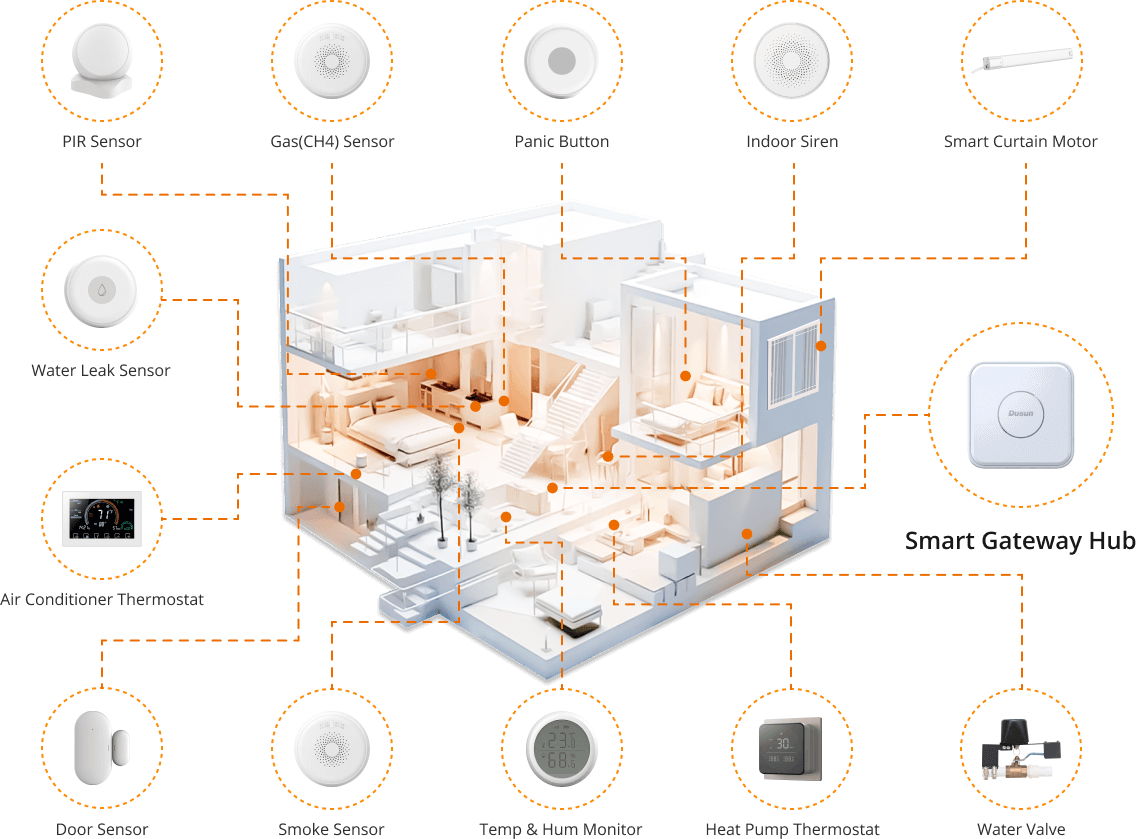
What Communication Protocols Does The Gateway Hub Have to Support?
- Multi-protocol support: The gateway hub can be designed to support multiple communication protocols since smart home devices may use different protocols like Zigbee, Z-Wave, and WiFi.
- Protocol conversion: The gateway hub may need to convert protocols to enable communication and collaboration among devices using different protocols.
Does The Gateway Hub Enable Real-time Data Processing?
- Low latency: The gateway hub should ensure real-time data transmission with low latency, allowing users to promptly receive device status information and enable real-time control.
- Rapid data processing: The gateway should possess powerful data processing capabilities to quickly respond to data requests and instructions from various devices. (welcome to consult Dusun IoT on gateway hub’s data processing capability, we have a lot of devices for selection.)
What Cloud Data Transmission Protocols Are Supported By the Gateway Hub?
- MQTT: A lightweight publish/subscribe messaging protocol suitable for asynchronous communication between IoT devices.
- CoAP: A lightweight communication protocol for constrained networks, suitable for low-power and low-bandwidth devices.
- HTTPS: Ensures data security during transmission and is crucial for scenarios requiring encrypted communication.
Does the Gateway Have Sufficient Security Capabilities?
- Encryption and authentication: The gateway should support data encryption and authentication mechanisms to prevent unauthorized access and data breaches.
- Firewall and intrusion detection: The gateway should allow you to configure a firewall to filter unauthorized access and implement an intrusion detection system to monitor and respond to potential threats in real-time.
- Remote configuration and management: The gateway should provide user-friendly interfaces and tools for remote configuration and management of the gateway and connected devices.
Does the Gateway Hub Support Modular Building?
- Hardware modularity: Designing the gateway hardware with modularity will allow for expansion or replacement of components based on specific requirements.
- Software modularity: If you adopt a modular design approach for the software, it will be easier to add, modify, or remove functionality while enhancing system maintainability and scalability.
In addition, there are a few other factors that should be considered:
Compatibility and Scalability
When developing a smart home gateway, it is essential to consider compatibility and scalability. The gateway hub should support multiple communication protocols and device types, allowing for the integration of a wide range of smart home devices. Additionally, the gateway hub should have good scalability to adapt to future development demands in the smart home market.
Stability and Reliability
A smart home gateway is expected to operate reliably over long periods. Therefore, during the development process, it is crucial to focus on stability and reliability. Measures such as optimizing hardware design, improving software quality, and enhancing heat dissipation and protection should be taken to ensure that the gateway can operate stably in various environments.
Easy to Use and Maintain
As the entry point of a smart home system, the gateway hub should have a user-friendly interface that is intuitive and easy to navigate. Additionally, it should have intelligent features that enable automatic device recognition, network configuration, and firmware upgrades, thereby enhancing the user experience.
What Pitfalls Should Be Avoided When Developing Smart Home Gateway Hubs?
First and foremost, it is essential to prioritize the network queue performance of the gateway hub. If the gateway has deficiencies in handling network queues, it may lead to traffic congestion and negatively impact the overall stability and performance of the entire smart home system. Therefore, when designing and developing the gateway hub, it is crucial to thoroughly consider optimizing the network queue to ensure that the gateway can efficiently and reliably handle network traffic.
Secondly, it is important to ensure that the gateway hub supports the protocols you require. Different smart devices may utilize various communication protocols, and if the gateway hub does not support these protocols, smooth communication with the devices cannot be achieved. Therefore, when selecting and developing a gateway, it is necessary to have a deep understanding of your device requirements and choose or develop a gateway that can support these protocols.
Additionally, while developing a custom gateway hub is suitable for large-scale prototyping, attention should be paid to the potential risks of transitioning the technology stack in the future. Once a specific technology stack and architecture are chosen, it can become challenging to switch to other technologies later on. Therefore, it is important to consider possible future technological changes and upgrade requirements from the beginning of the development process, ensuring that the gateway hub design has a certain level of flexibility and scalability.
Final Words
The selection and development of smart home gateway hubs are crucial for the stability and performance of the entire smart home solution. In this field, Dusun IoT has emerged as a leader with its rich experience and strong technical capabilities.
We understand that each customer’s needs are unique, which is why we offer a diverse range of embedded hardware options for you to choose from. Whether you prefer to start with a system on module for independent development or lean towards a modular design gateway hub, or even just need to port software onto a mature gateway hub, we have corresponding solutions to meet your requirements.
If you are looking for a reliable smart home gateway solution, we welcome you to inquire about our gateway customization options. We look forward to collaborating with you to create a smarter, more convenient, and comfortable home living experience.







